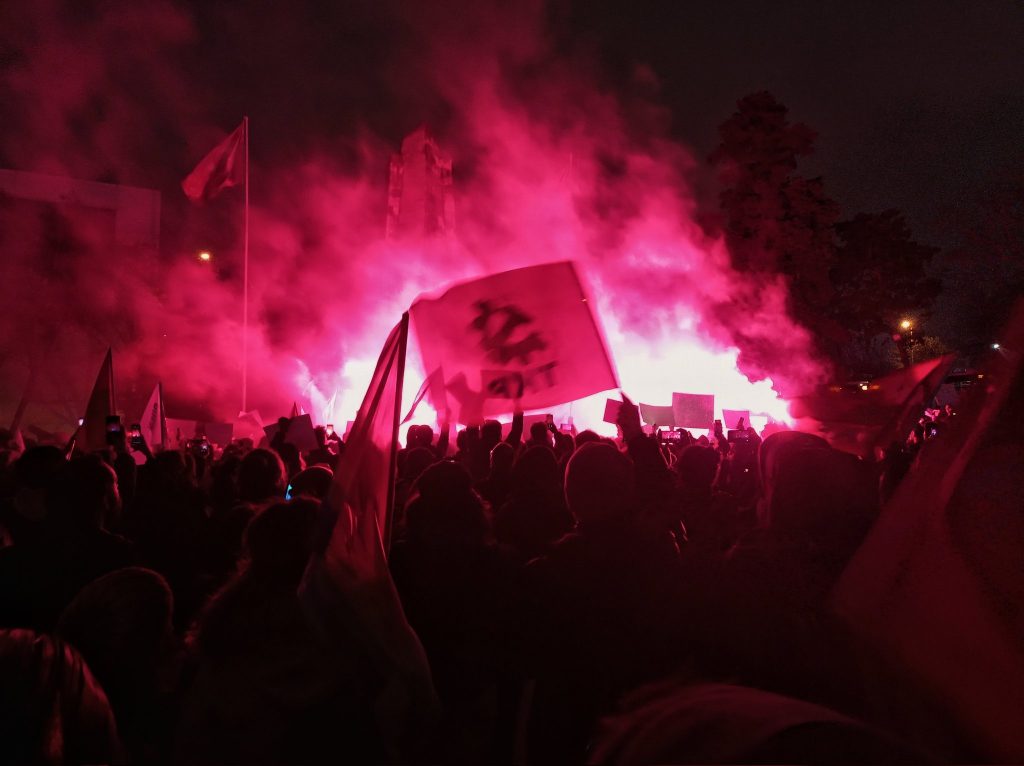Earlier this year, in January 2022, I was able to witness the work of the TKP and interview a member of their Central Council. The TKP has grown immensely and continues to do so, offering strength and a voice for the working class through the inspiring work of our comrades abroad. They have implemented a series of programs and campaigns with wide degrees of success from the free vaccination of villagers to Worker’s houses that organise trade unions.
Turkey has faced a significant economic crisis since 2019, recently a sharp increase in inflation, followed by the devaluation of the Turkish currency, the Lira. The TKP responded to this economic crisis with a campaign that has the slogan ‘Against Expensivness, Rise Up!’ (Pahalılığa Karşı Ayağa Kalk!). What is the current economic situation?
Mehmet: The direction that Turkey is heading towards is a crisis surrounding its currency. The necessary materials that Turkey needs to function are imports from abroad, therefore this has made the Turkish economy reliant on currency exchange. Such as in Turkey, when we see the currency devalued, we see the price of petrol increase, we see the price of basic necessities increase, according to its attachment with the dollar. For the working class this means a serious increase in poverty, we can say this increase in poverty has been occurring for the last 3 or 4 years and even perhaps since the coup attempt of 2016. We see this because of serious economic mismanagement and when you look at it within the past 10 years you see a serious decline in the standard of living for the average person.
This means that the economic gains that were achieved by the working class in the early 2000s have become reversed. However, when we look at the economic gains that businesses have made since the beginning of the pandemic it is at record highs and despite this, the wages of the working class has decreased. The first reason for this is because of the fact that Turkey is a capitalist power in which the bourgeoise hold power and secondly, the economic gains made by the Erdoğan government wasn’t done for the benefit of the working-class but to make the bosses richer, and when the workers want to rise up in order to seize the rights they are entitled to, the TKP seeks to reflect that wish with our slogan. Turkey has been in a state, for the last two years, in which when the working class want to rise up they face arrests and police brutality and this has meant a state of emergency where workplace strikes are essentially forbidden. Erdoğan has gone to the bosses and told them ‘Look, we’ve gotten rid of strikes, what else would you like’.
Erdoğan is the former Prime Minister (2003- 2014) and now President of Turkey (2014-), and the de facto leader of the AKP (Adalet ve Kalkınma Partisi, Justice and Development Party) since 2001, a far-right conservative islamist party that is the governing party of Turkey since 2003.
This has made the current situation of the working class in Turkey a unique one where they’ve become increasingly impoverished and unable to achieve their life goals, and when they do raise their voice they’re faced with an increase in police attacks. For example, within the first days of 2022, we saw the increase of electricity price by 120%, this has meant that the working class can’t afford this basic necessity during a time of harsh winter. The AKP has attempted to stop any revolt against this.
The work of the TKP is to ensure that the requests made by the working class for a humane way of living can be achieved, when the working class come together, not only for the victory of the struggle against the current conditions but also to dismantle this capitalist system then we can win. This is why we’ve put alongside our slogan Ayağa Kalk! (Rise up!). We saw that when we organised demonstrations following the value of the dollar increasing 30% against the lira in one day there wasmassive support out in the streets by the people. The videos of these demonstrations received millions of views and tens of thousands of likes, this showed to us that there was a serious amount of support in solidarity by the working class for this cause.
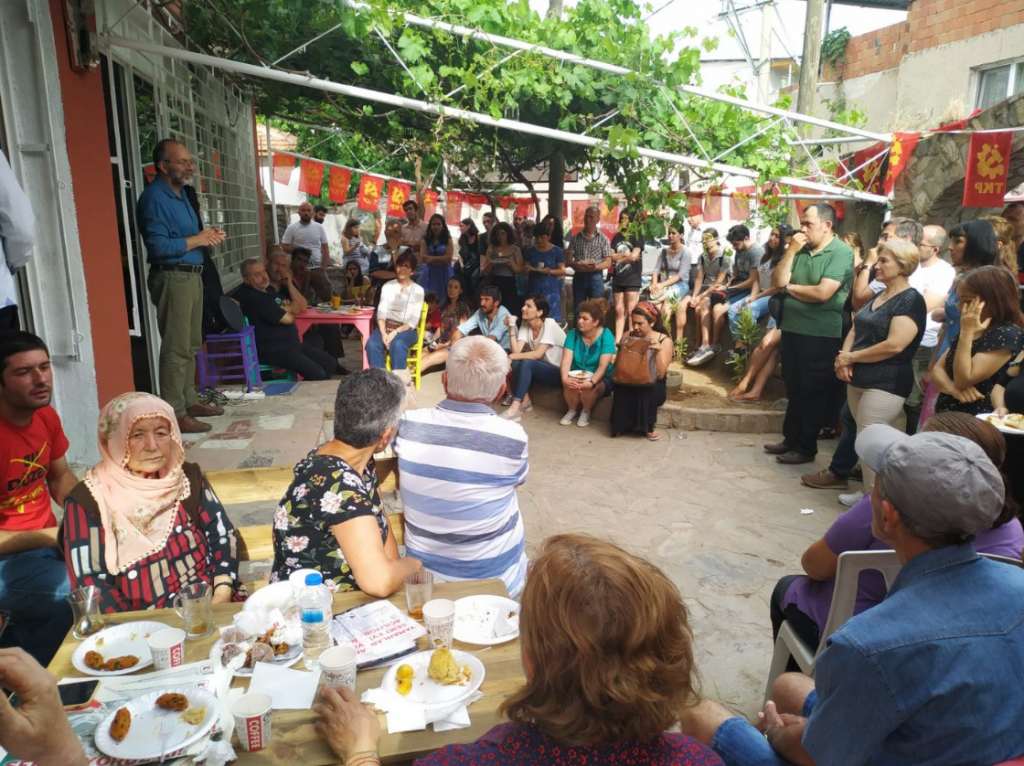
Last month the TKP took part in a mass demonstration with DİSK (Confederation of Revolutionary/Progressive Trade Unions), against rising expenses. What is the state of the trade union movement in Turkey? How has the TKP been able to organise with the trade union movement in order to challenge the ruling class?
Mehmet: The state of the trade union movement is very divided and the bosses rely on this, on the workers being unorganised, so that the bosses can act confidently and comfortably. This situation has allowed the bosses to do mass firings, make people work without insurance and remove necessary work safety measures. They’ve been able to do this with a single step because of this situation regarding the
unions. Worker’s have been able to become organised and struggle against the bosses in some examples, however, the trade union movement is still very fractured and divided, especially in connections between one another. An instance arose when a Canadian firm opened up in Turkey and its workers attempted to unionise and the firm fired a large number of people in order to stop this, this shows that even attempting to unionise is itself a very gruelling, long, and drawn-out struggle in Turkey but the struggle with the Canadian firm was ultimately a victorious one by the end because it was able to last so long. We also saw demonstrations held by coal workers, who, despite having low numbers out in the streets, had tremendous support from the general public and the trade union movement.
Witnessing these problems in the trade union movement, the TKP formed the Birlik sendikası (Unity Trade Union) about two years ago. This trade union aims to represent sectors that are historically underrepresented in trade unions, these are; restaurant workers, waiters, cafe workers, bar workers, private school teachers, and more. In other sectors of work, for example, metal workers, unions such as DİSK have historically offered very strong development for the organisation of those workplaces, but we do not see this same development for workers who work in restaurants, cafes, and supermarkets. The TKP aims to solve this with the Unity Trade Union in order to ensure that these workers are unionised and provided power.
What were the results of this trade union? Well, for the first time in many years we saw a victory for private school teachers, Doğa college which is one of the largest private schools in the country was able to win back rights that they had previously lost as workers because of an organised action of resistance. Another result of this trade union is that the TKP has ensured that the union is one that fights for textile workers and makes sure that as many textile workers as possible are organised, this is because textile workers are workers in Turkey who are one of the highest in terms of being undocumented and workers that are left without health insurance, they are also one of the largest sectors of work with millions of workers who are left unorganised. The TKP has ensured that these workers are now organised and with the Unity Trade Union millions of workers who were left unorganised are introduced to an organised struggle. This is a new area of work for the TKP, to form its own trade union, but it is an area of work that holds a lot of potential for victory.
DİSK formed demonstrations against the increase in the rate of inflation in Turkey, what’s officially recorded by economists from an institute that is controlled by the AKP and the government as a less than 60% increase in inflation, a scary number, but statisticians believe the real rate of inflation is an increase above 100%. DİSK organised demonstrations regarding this issue, to which the TKP gave its full power and full support. The TKP saw this as a movement that was politically on the side of the working class struggle by DİSK who has had a long and rich history in the struggle for worker’s rights in Turkey.
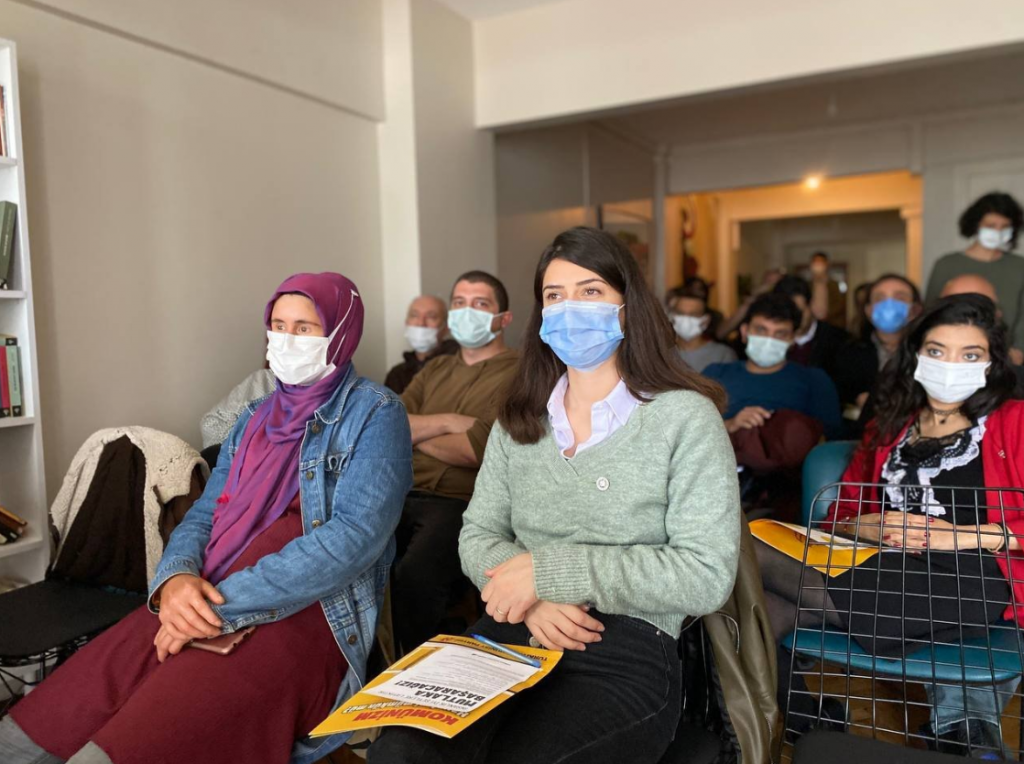
Currently, there is a TKP Workers’ house and District house in almost every neighbourhood in Istanbul and the district’s of Turkey. Why was the TKP Workers’ houses and District houses founded? What have they been able to achieve in organising the working class of Turkey?
Mehmet: The District and Workers’ houses formed following a TKP conference with the working and labouring classes in order to build a culture of a united working-class that is based around solidarity to be able to combat the struggles they face in their lives. Workers can’t stand on their own two feet by one by one and the current culture that we have is that in order to succeed you need to defeat the person next to you, we however do not subscribe to this political thought, we believe in the opposite. Only when the working class struggles together, only when the working class works together, can we stay alive.
The District houses seek to implement this aim. They’ve been established in neighbourhoods across Istanbul and Turkey that have been left behind, it allows for the workers in these areas to come together and discuss and join the struggle around their daily lives together. Where can this come to light in Turkey? Well, a struggle that a lot of people in Turkey face is the lack of nurseries across the country and because there aren’t these nursery schools a lot of women can’t become workers or they find it very difficult to manage while also being a worker. So the District houses, when faced with this, can provide nursery services to the area, but this shouldn’t be understood as only a grant or kindness without context, all of those activities also support the political activity of ours among the working class.
The Workers’ houses also function as a place where workers can come together and organise against the bosses, it isn’t a struggle left to the individual, there is a place where they can come together and organise against their bosses with support in legal advice and whatever else is needed.
We say that we have to create real political change that the working class can observe, otherwise the ruling class and its media will do whatever it can to make sure that the work of the Communist Party is either hidden or vilified. However, if we can reach out to all aspects of the life of the worker and in a very natural way be a part of all their struggles and act to support a solution for their problems and struggles in their daily lives then we will create a connection with the workers that portray the Communist Party in the correct and truthful way, that is what the District houses achieve.
We can see this wherein a lot of the places where we’ve established the District houses there used to exist a lot of labourers who had either no knowledge about communism and socialism or adopted a very incorrect and negative view of communism and socialism, because of an inaccurate description by the media, but because of the District houses, they were able to meet with the Party and participate in working-class politics and take a step in organising for the worker’s struggle. Because of the District houses, they are able to do this in a genuine way with the Communist Party.
The activities of the District houses is very spread out, for example, in Bursa, in a working-class immigrant neighbourhood, the District house provides reading and writing lessons to Syrian refugees. In other District houses, they offer nursery services where that is the struggle that people face. In some other district houses, we provide tutoring services for students in secondary school who can’t afford tuition and students who can’t go to secondary school.
The Workers’ and District houses also allow us to hold political conversations and meetings, party meetings and conversations so that the workers around the community can become accustomed to these discussions and have a central place where these discussions take place. The Workers’ and District houses allow for people to come together and help with each other’s needs so when it comes to the District houses sometimes what is needed is tea and people come together and buy that, in othercases, they come together and, with little money, make resistance- themed necklaces which they donate to people on the street to make people cheerful and optimistic.
Instead of a capitalist system in which we do not help each other in our needs, we want to create an order that is the opposite of this within a socialist order and prove that this is possible by providing these houses in which people can see examples of the new order we’re working to build. We currently have around 100 Workers’ and District houses [exact number 81 and growing] and this was built over the last 2 years, without a pandemic we would’ve definitely built a lot more, our goal by the end of this year is to double the number of District houses in order to organise the working-class in new areas.
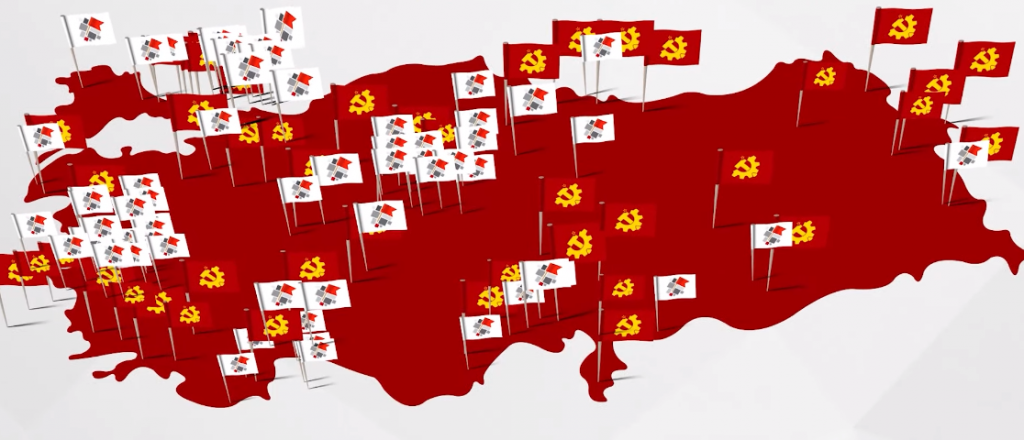
In Gökbük, a village in Antalya there is a TKP villager’s house, in rural Ikizdere there was popular resistance to a new stone quarry. What are the conditions that the rural population of Turkey face? What’s been the experience of the TKP in organising in rural areas?
Mehmet: In Turkey, the population of villagers has drastically decreased. This is because people are left there by themselves or only with their family and often see it more economically advantageous to be a worker in the city. However, Turkey is a country with a large population and therefore there is a lot of people living in these areas. The work of the TKP, and the aims of the party, in general, is to work with the villages in Turkey with the specific problems that they have and not something to adopt for all the villages across the country. Gökbük village house is our first village house, established as an alternative to the District houses. Similar to the work of the District houses the work of the village houses are viewed as organising spaces by that area to resolve the struggles they face amongst themselves. What do they do? the HPV vaccine (a vaccine for women and girls to prevent certain kinds of cancer) is not free, while it is free in many countries, this important vaccine for women’s health is sold at an expensive rate in Turkey and recently the party is working so that the state provides the vaccine for free to the working-class people.
On other hand, we are collecting vaccines through acts of solidarity, this solidarity is achieved through donations in which we become responsible to distribute these vaccines for free to the hundreds of women who want them. In Gökbük, doctors and other healthcare professionals who are part of the Communist party visited the village and administered vaccines to at least 20 women every day they were there. We are taking up a service that the current system and government both doesn’t care about, a service it fails to provide for the healthand education of these areas. This allows us to introduce our Party’s politics into the area as well as showcase an alternative to the existing model.
What’s happening in Ikizdere is similar to protest movements that have previously existed throughout that region, the AKP government privatised the forests of Turkey and the majority of these forests were sold to foreign private companies who then began to mine for the coal reserves in most of the forests. The Ikizdere resistance comes from similar developments, the AKP government, without any concern for the destruction of the natural life in Ikizdere is building road links that destroy a lot of the nature and wildlife in Ikizdere. The people reacted to this with resistance, much like similar reactions across the country at the time, and the TKP was a part of these actions, for weeks we sent busses of our comrades to ensure that the voices of the people were heard, we worked hard for this. We saw the elderly of the villages stand in front of police barricades and protect their livelihoods.

In Turkey these likewise reactions see widespread support, the smallest resistance becomes mainstream quite easily and receives a lot of news coverage. In actuality, the mainstream news media tries to ensure these resistance movements are never heard about, however, the people among themselves in alternative news channels and social media ensure that even the smallest of resistance movements is shared and heard about. Because of this, Ikizdere became symbolic, perhaps we can even say that because of this Ikizdere became the largest out of these movements last year as a wave and uprising across the country.
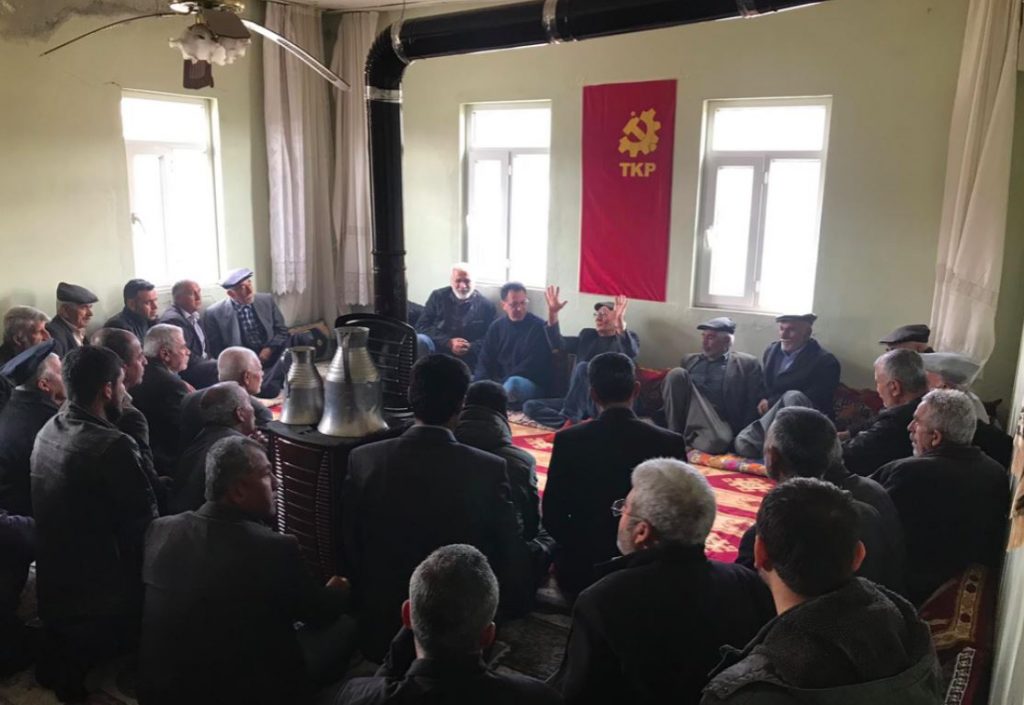
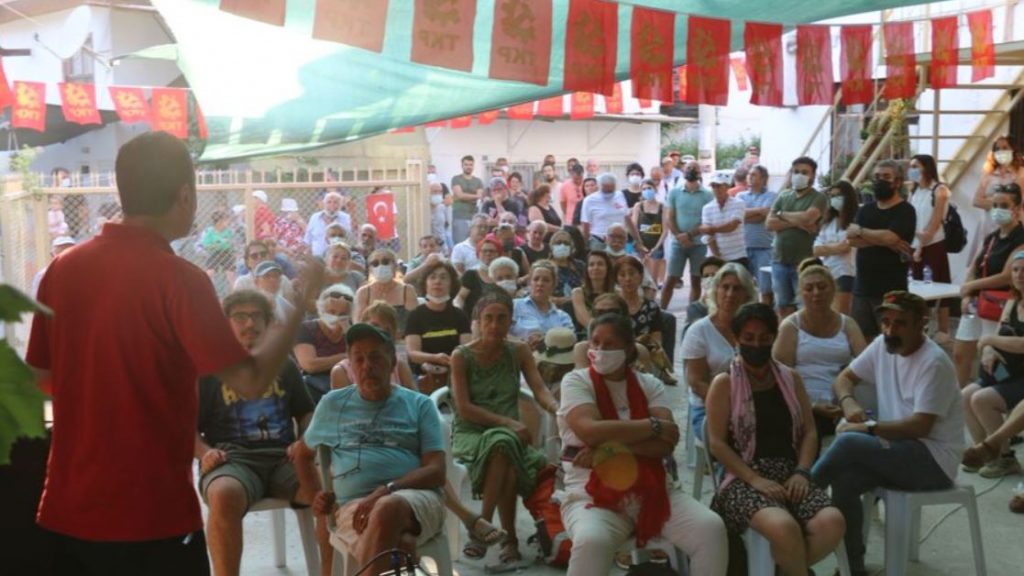
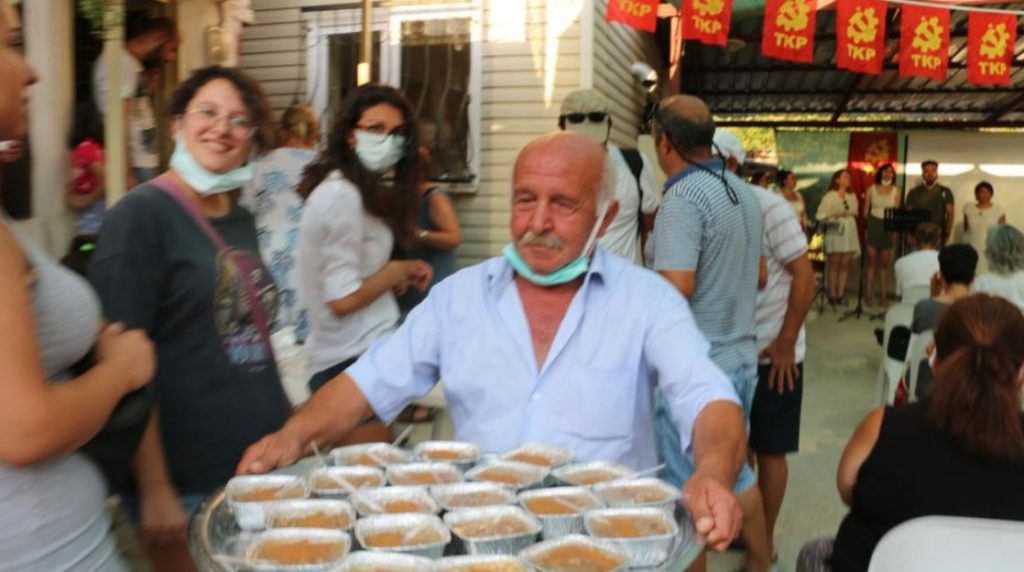
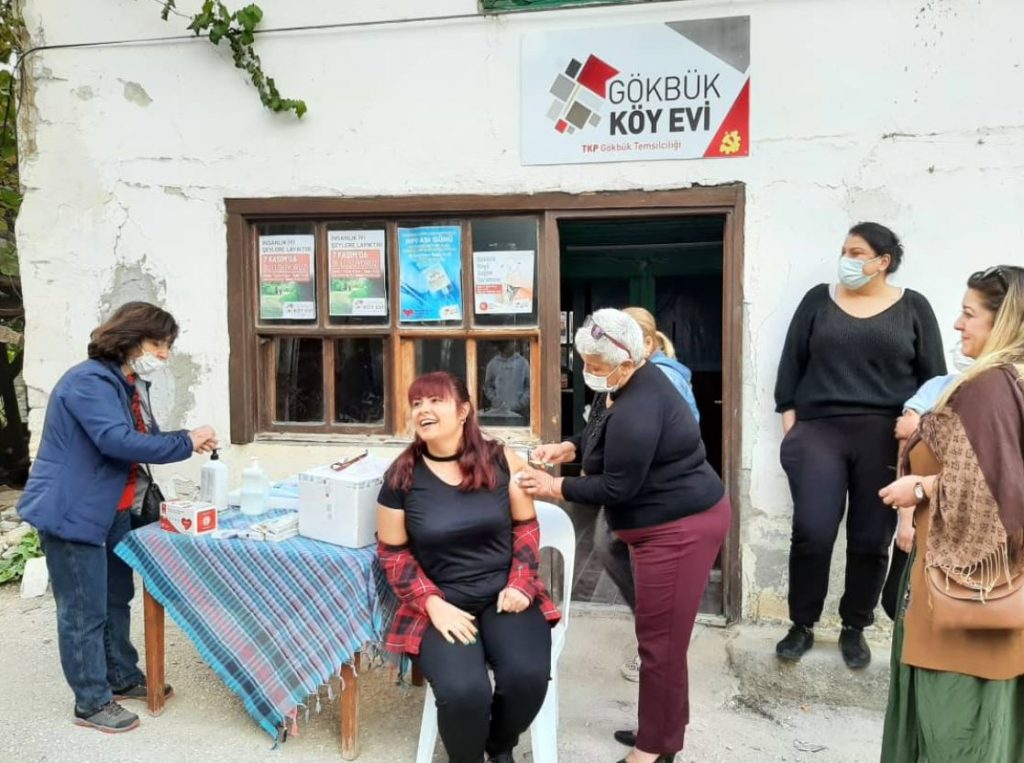
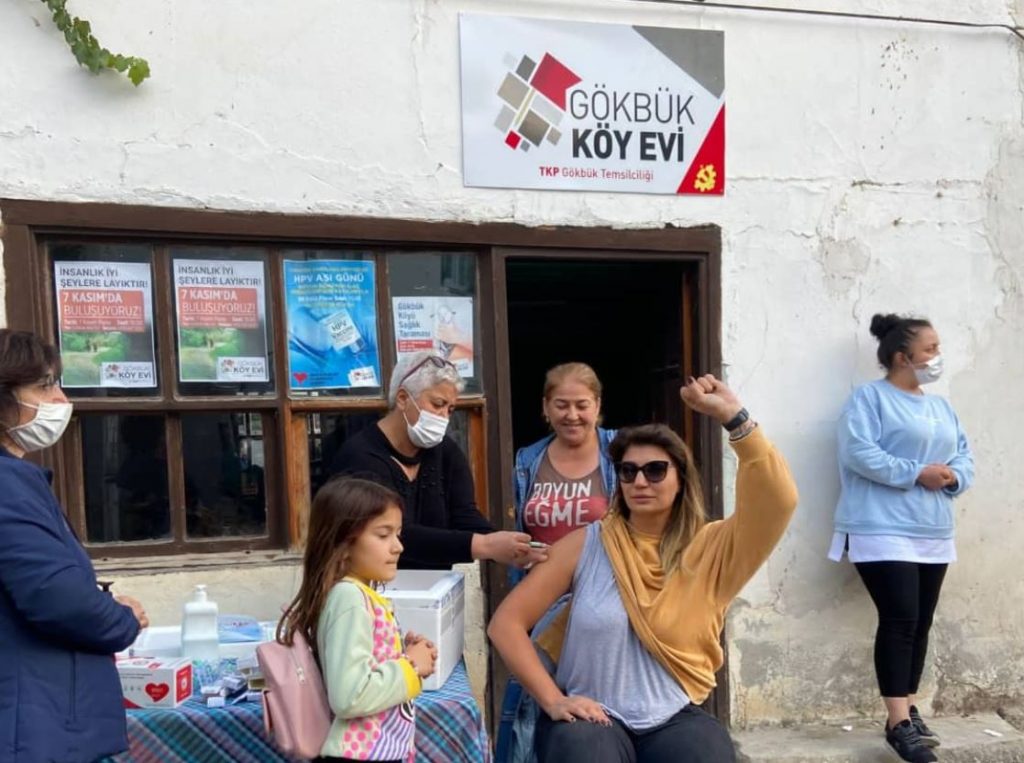
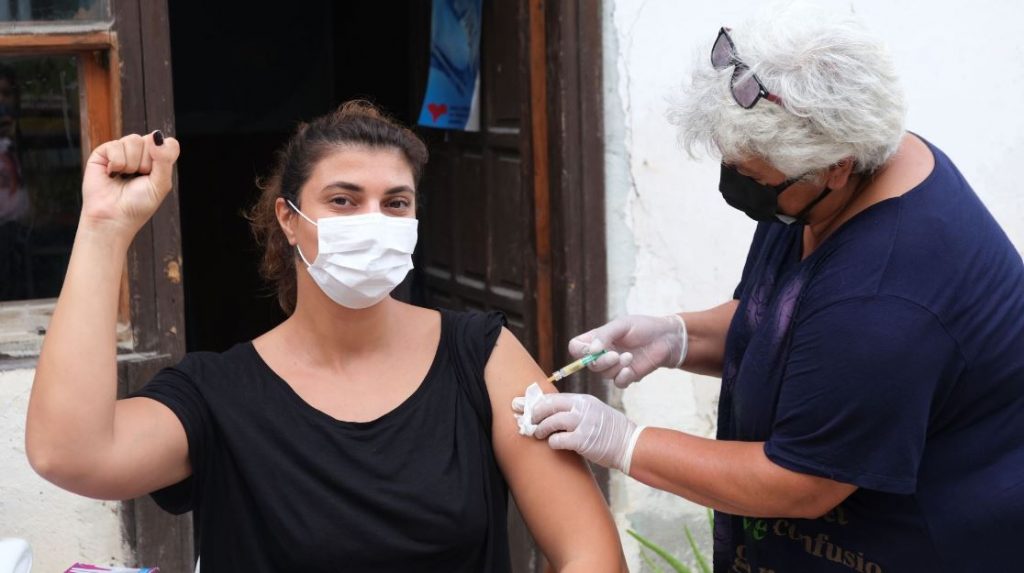
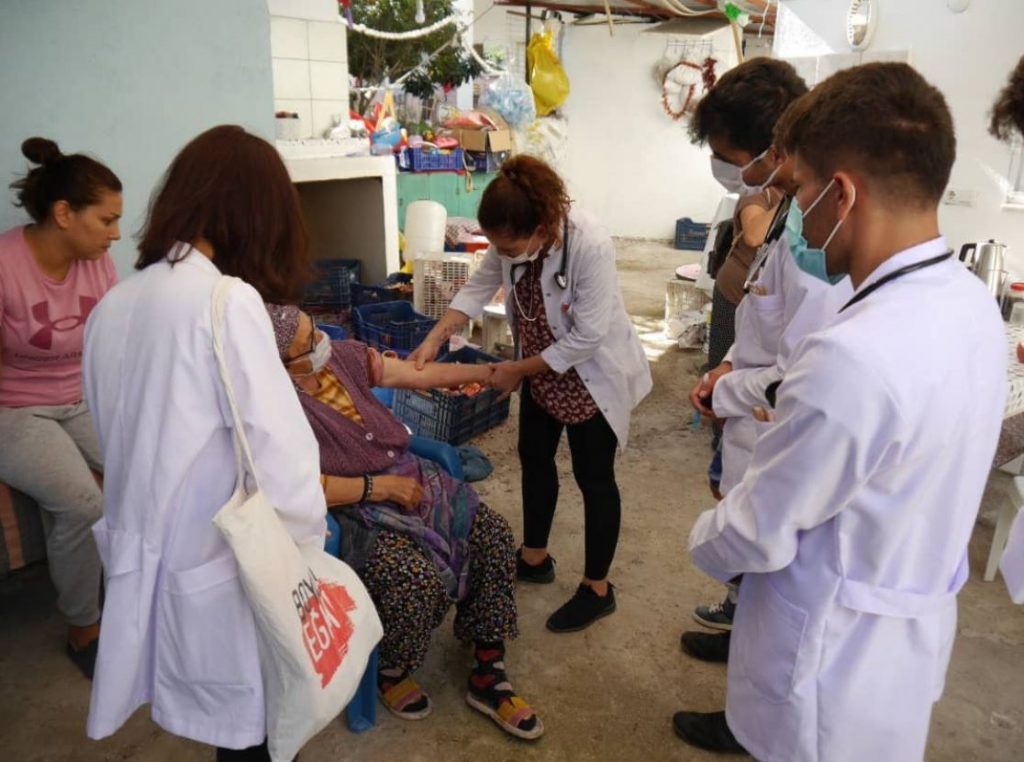
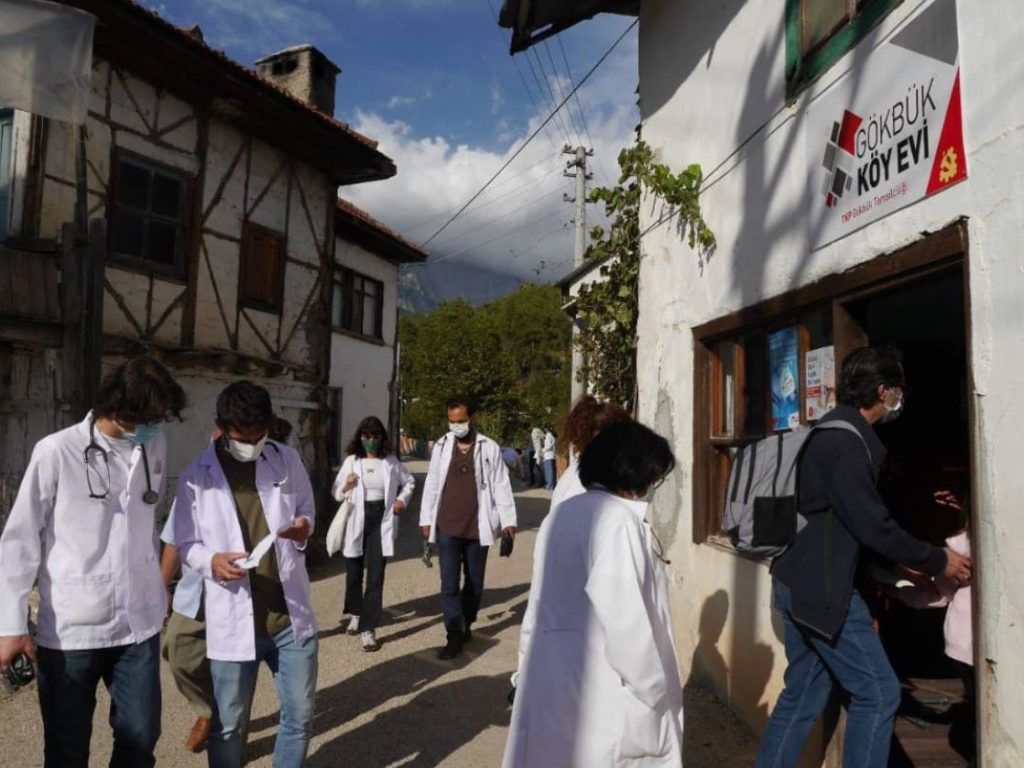
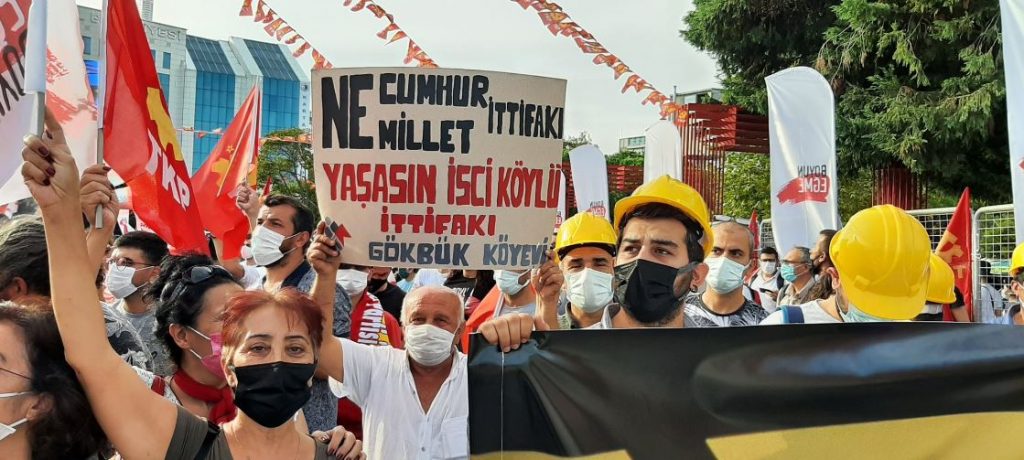
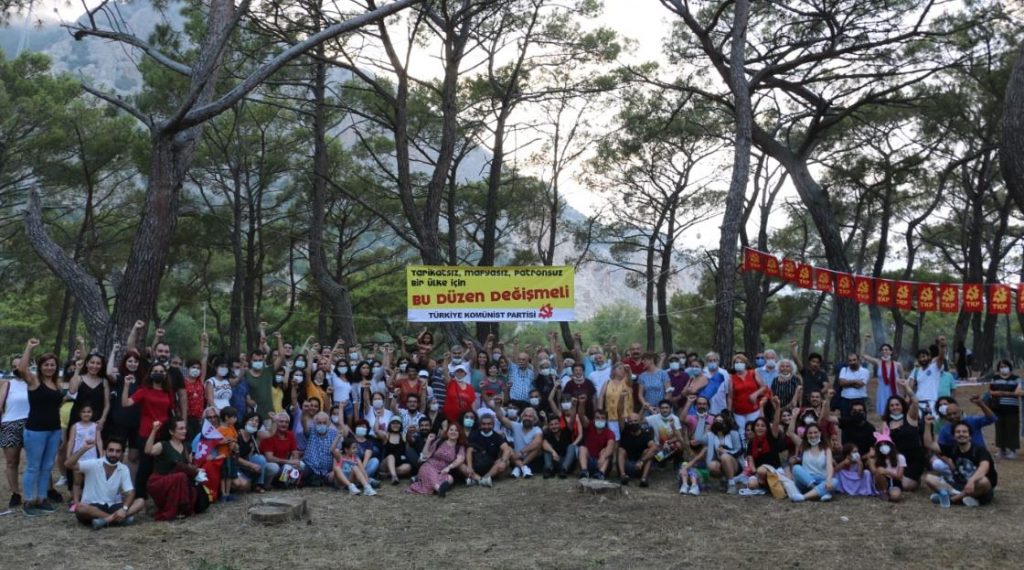
In the Boğaziçi university protests earlier this year, a large number of students demonstrated against the ruling AKP government with a nationwide protest campaign that lasted for many months. What is the current situation of the student movement in Turkey? How has the TKG (Türkiye Komünist Gençliği, Communist Youth of Turkey, youth wing of the TKP) been able to organise against these challenges that students face in Turkey?
Mehmet: The student movement’s inside of Turkey for many years has always acted for freedom and equality. We can say it like this, the largest movement of socialism and communism in Turkey was during the 1960s and 1980s, this was also a period of struggle hard-fought by the student and youth movement. Historically, we can say, the students movement has been viewed, since the founding of the country, as the movement that can claw Turkey out to liberation. Because of this special importance is given to the student’s movement by all sides of the political spectrum. In recent years in Turkey, higher education has become essentially free and this has resulted in the children of working-class families attending school on a fairer basis than before.
The events in Boğaziçi is not too dissimilar to other movements in Turkish universities. In Turkey, if a student movement mobilises from increased prices of school food this draws a lot of sympathy from the public and it becomes news that is viewed as a high priority. Since Boğaziçi is viewed as the most prestigious or best state university in Turkey, their mobilisation was seen as impactful and drew a lot of support from the public.
In the past couple of years, the AKP has taken over control of the appointment of rectors (equivalent to the position of Chancellors in British universities) and other university administration positions, this happened to Boğaziçi in 2016 at first but this wasn’t met with resistance since the previous rector was replaced with an academic who works in the university. However, the mistake made in 2021 by Erdoğan was appointing someone to the position of rector from outside of the university, someone who has no relationship with the university at all, someone who, importantly, used to be a candidate for parliament from the AKP.
The students didn’t accept this and mobilised action, despite the pandemic at the time, the numbers of people in these events were significantly high and organisations from multiple struggles became involved. We can initially say the uprising did result in success because the AKP had to replace the nominated rector after a couple of months, the newest rector appointment was a repeat of 2016 and an academic from within the university was chosen, but we can’t claim this as a complete success because the factors that led to the protests remained unchanged but the Boğaziçi protests importantly taught us a lesson that when the students and the workers unite in organised struggle then it is possible to force the AKP government to take a step back.
The current bourgeois political opposition in parliament constantly says to the public that the people shouldn’t organise, we shouldn’t be out in the streets, and to be flexible in our demands (in other words, unprincipled). ‘We will solve your problems after the elections’, they say. The bourgeois opposition says this because they are close to the bosses in Turkey and afraid of political change that is achieved through a people’s struggle in the streets. After all, if the AKP government collapses because of a people’s movement in the streets, then they [the opposition] will have to confront the people too. The successes of the Boğaziçi movement demonstrated to us that such a movement can last so long and further showed to us that these movements out in the street can win wherein the AKP takes a step backwards.
The TKG (Türkiye Komünist Gençliği, Communist Youth of Turkey) was heavily involved in the Boğaziçi protests and our members within the university were organisers in the movement. Most importantly, we insisted for an election between academic staff to choose a new rector, in order to remove the legitimacy of the appointed one, remained united in this decision, and remained united in rejecting the recognition of the then-nominated rector. In the events outside of the university, we ensured that we lent as much support as we possibly could and provided a large number of our resources and manpower to ensure that the protest movement lasted as long as it did. A lot of policerepression followed these events and a lot of our comrades were arrested, but this allowed for the student movement to persist and showed that it required the power of an organisation for movements like this to succeed, we at the TKG and TKP did our best to make sure our organisational efforts would support the movement and that this would be felt.
What are the challenges that students in Turkey face?
Mehmet: According to the political theory of the TKG, the students of Turkey do not need separate demands or needs to the working class. Most students have to work to survive and often do so without insurance, work in minimum wage jobs like bars and cafes, and even get paid far below the minimum wage when they work in internships. The demands of the students are related to the capitalist system in Turkey. Secondly, there is a serious imposition of the theocratic ideology by the AKP, as its main ideology, this is done so that students, as people who are forced into employment, are aware of the problems that the working-class face but can’t be allowed to have a free debate. 9 out of 10 students you ask in the street will definitely tell you that Turkey is facing a very difficult situation and people are facing hardship.
The main problem is that students have certain anxieties or uneasiness around organising, a part of this problem is because of the repression by the AKP, questions of whether they can find work in the future or continue their future in Turkey haunt the minds of students resulting in them being worried to organise. Secondly, a faction of students believe that there is little to no hope in Turkey being able to change, to this we can say that we have to get rid of the bourgeois ideologies that exist in Turkey that perpetuates this belief. A lot of students dream of studying abroad but only a small section of these people can achieve that dream and of those that do study abroad, they’re stuck in low-paying jobs because of their status as immigrants and become exploited by the companies of these foreign countries. The bourgeois opposition contributes to this way of thinking, that Turkey will never change, the TKG acts to ensure that university students conduct organised work in their universities and cities and that they prioritise hearing the concern of other students and provide the political education to remove this pessimistic way of thinking. In a lot of universities, we have university clubs that ensure that students can come together to act and, as we’ve said, in a lot of universities we have a lot of branches where we explain to interested students about Marxism-Leninism and confront the struggles they face in their lives, for example, the increasing price of food in the canteens.
By joining an organisation and providing an ideological education it allows for them to develop as a cadre in our party, to realise they’re working-class as most students in Turkey are, despite this being rejected by a lot of people that students aren’t workers. Claims that students are only on the wayward to becoming workers, ‘you’ll see only after graduation you’ll become a worker’ is usually said but then we find that this isn’t true either since over 30% of university graduates are unemployed and a lot more are in employment outside of their area of study and/or being paid minimum wage. These hardships contribute to the pessimistic way of thought, however, Turkey is in a position of great potential for our struggle and the TKG by capturing this potential is increasing its organised strength.
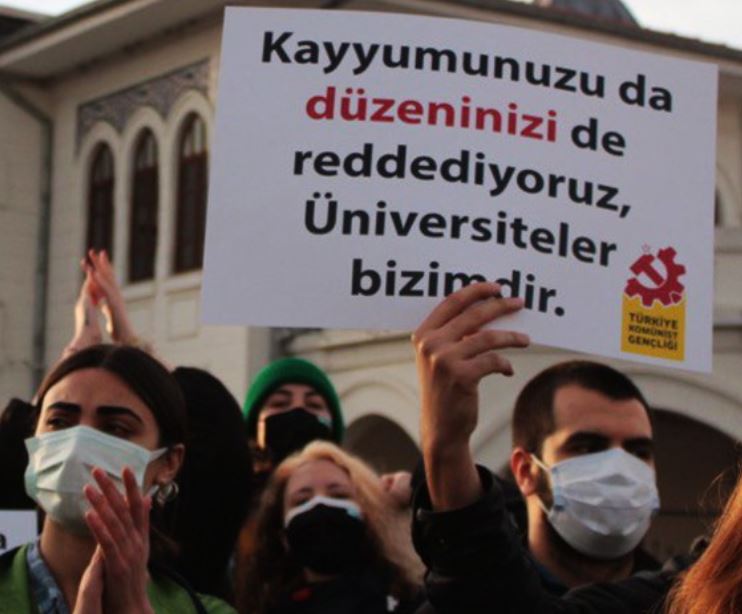
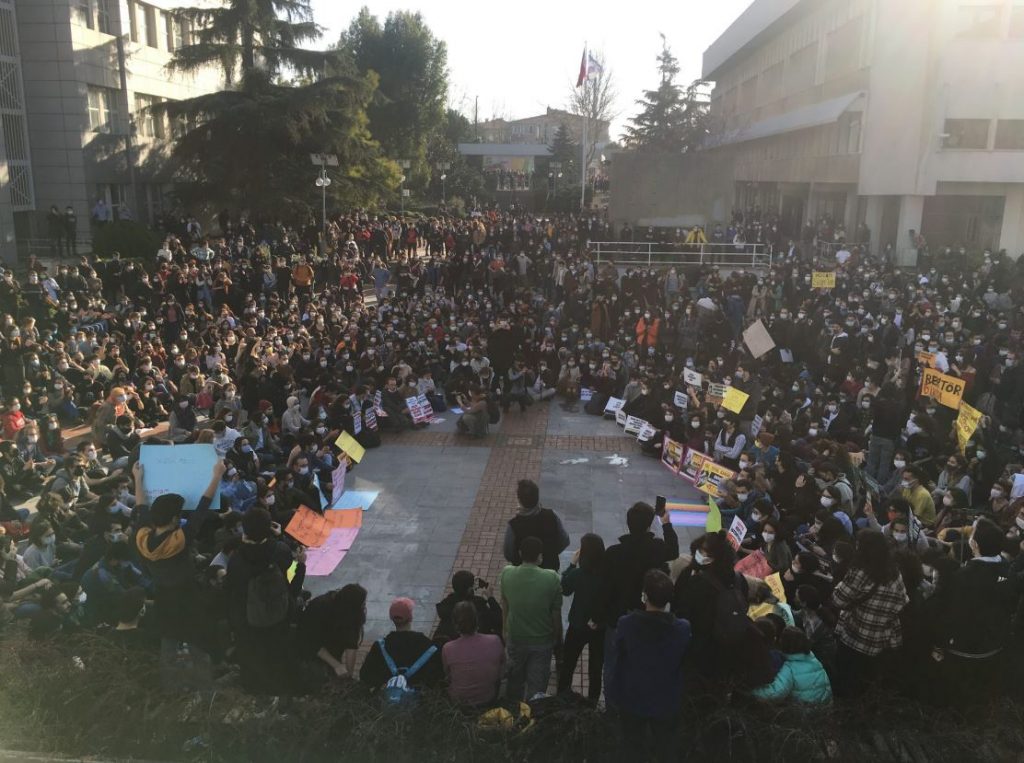
Violence against women has drastically increased across the world, Erdoğan withdrew from the Istanbul Convention last year, an international treaty on combatting violence against women, this was done after a horrifying year of violence against women in Turkey. LGBT people are also often victims of attacks by reactionaries. How has the women’s and LGBT liberation struggle, under the TKP, been able to organise against the reactionary elements of Turkish society and the Turkish state?
Mehmet: In Turkey, the situation of abuse against women in the last couple of years has led to an increase in women organising for the struggle. Today in Turkey, the largest marches in the streets are led or in support of women’s causes. The reason for this is because the AKP’s ideological forefront is to attack the fundamental rights of women, restrict women from achieving any other rights, and impose a backwards way of living.
Seeking to answer why this is their direction, the TKP answers that, in Turkey, the AKP is a party that acts in the interests of the capitalist class and seeks to open new doors of repression for the capitalist class and because of this they’ve utilised reactionary religious elements as the forefront of the ideology of the party. The AKP never hid the fact that they are a reactionary party, when they were first elected they openly said that women and men were not equal and that a woman’s place was in the house. A lot of their statements empowered the narrative that abusers of women repeat. This is something that the modern worker’s movement in Turkey can’t accept, there are millions of women who work and support the struggle to uphold their livelihoods, the women’s struggle is part of the overall revolutionary struggle within Turkey.
So, what do we need to do to achieve this struggle? In Turkey, the majority of the working class needs to move to an environment of secularism. This is a move away from living their whole life according to religious dogmatism and move instead towards a modern way of life. This means a woman can get any education they want, get into any school they want, walk in the streets at any point they want to, and work as an equal to a man in their job.
At the same time, at their place of work, they shouldn’t experience a workplace environment that is unequal to what a man faces, a punishment by the boss because they’re not a male. It means they should be allowed to work equal to men and have equal wages. The AKP formula is to ensure that women are either jailed in their houses or face unequal pressures in their workplace compared to men. Last year, the TKP set up the Women’s Solidarity Committee, the function of these committees is to carry out similar work to the District houses out in workplaces, universities, and the streets but instead when women face discrimination in the workplace they will meet together as the Women’s Solidarity Committees to organise what their demands are and what action they undertake. In universities, the people appointed to positions by the AKP are reactionaries who are virulently against the education of women, some have even gone so far as to assign reading for students to take home that instructs them to practice sharia law in the household.
For instance, they’ve indoctrinated students in classes into a false impression of Islam as one that allows the marriage of 9-year-old girls. The TKP, Women’s Solidarity Committee, and TKG have organised a serious struggle against this. We’ve said that to achieve an equal society we need to firstly adopt a secular environment and ultimately overthrow this unequal society.
This is similar to the struggles that LGBT people face, their struggles are similar to the struggle that women face, this is to say a struggle to find a job, a house, to be viewed as an equal by society in their life. Under the current order, their equality has become impossible to achieve because this order benefits from this inequality: women get paid less for their work, LGBT people are excluded to the point that they’re charged extortionately high rent prices. We say that however we struggle against this current system then the struggle of women and LGBT must be a part of it.
Today in Turkey, dozens of Women’s Solidarity Committee branches exist since their founding last year. The Communist Party of Turkey constantly seeks to have an active role against the hate crimes that LGBT people face and at the same time, we seek to ideologically challenge the chiefly liberal theory within the current movement.
We say this, our current struggle isn’t first and foremost a problem surrounding liberties, of course rights are part of our struggle, but our primary goal is to challenge the existing system as a whole and through that action we can end the issues surrounding the rights of people. In Turkey, in the last couple of years, with the increase in this struggle, when we talk with women and LGBT people we find their demands to be in the same category as ours, not to have identity politics at the forefront, but it is the demand to be an equal citizen. We know that the only way to have an equal society is socialism, equality isn’t a situation that is possible under the current system of capitalism, that’s why the forefront of our demand and struggle is socialism.
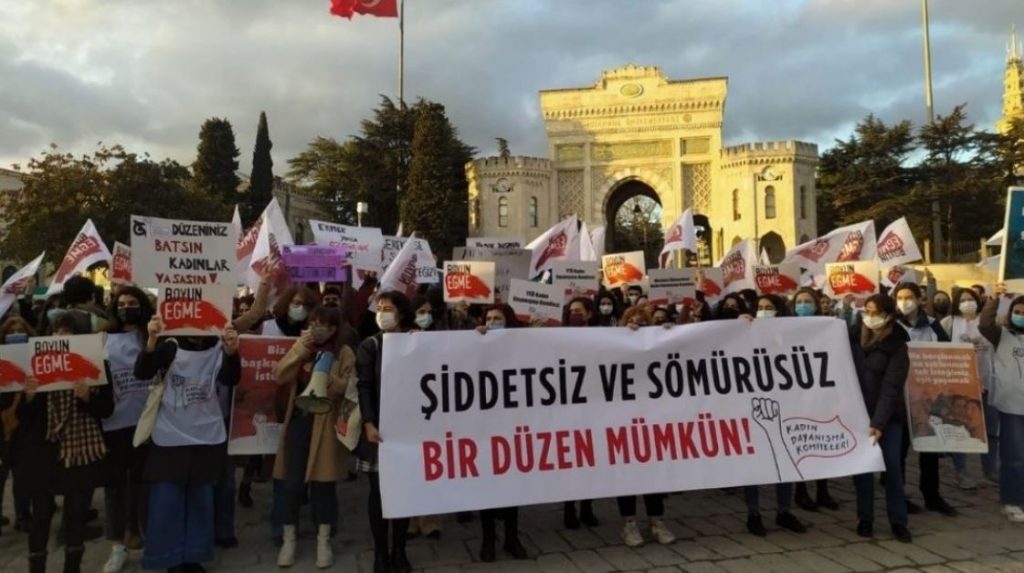
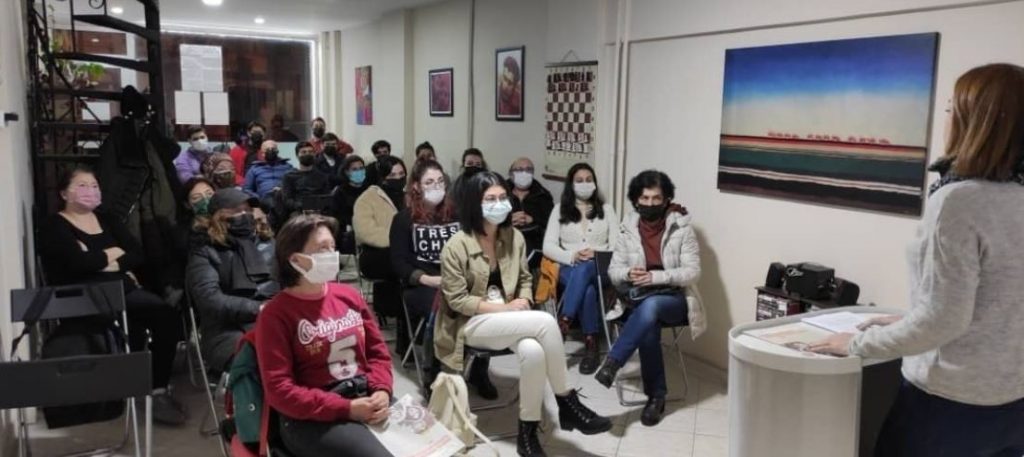
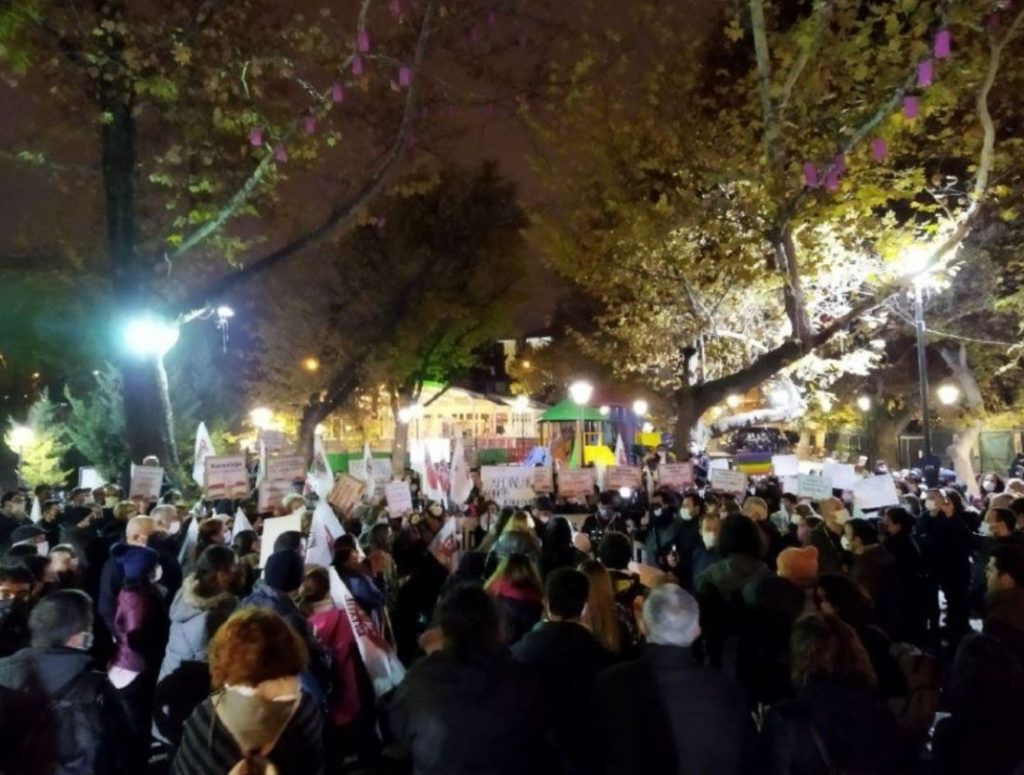
campaign: ‘We will establish a system without abuse and exploitation’, as the sign reads.
The Kurdish people are an ethnic group that continues to face persecution by the Turkish ruling class on the basis of their identity, therefore Kurds have become an extremely marginalised and oppressed people within Turkey. Political organisations across the Middle East have a position on where they stand regarding the Kurdish nation. What is the TKP position on the Kurdish question?
Mehmet: This has historically existed as a long-standing issue both within Turkey and the homeland of Kurds outside of Turkey. We can say this for the TKP line, within Turkey’s working class there is a significant proportion of our Kurdish brothers. For a lot of Kurds within Turkey, before the arrival of a lot of Syrian refugees after the outbreak of the Syrian war, the Kurds were the people’s group who were subject to the harshest and lowest-paying work in Turkey. These jobs, such as in construction and textile work, without health and safety precautions, without any insurance for their care, would be the work forced onto Kurds and it is undeniable that the Kurdish people are therefore a part of the working class that we want to work with.
But for Kurds this is not their only issue in Turkey, there are enemies against their language and culture by the nationalists of our country and state who try to turn people against each other. Within the last 5 to 10 years, these attacks have multiplied and intensified under the AKP government, the AKP shapes these attacks for their political benefit. To send troops into Syria, the AKP and the capitalist bosses also had to portray the people of our country as our enemies, this is what they do, the underlining nationalist politics of Turkey is for the development and expansion of capital.
It wasn’t the case before this, between 2009-2014 the Kurdish nationalist political movement had close relations with the AKP government and negotiated with them. Therefore we can say that the reason the AKP hates Kurds is not just because of their identity but because racist and nationalist attacks are a necessity for the benefit of the bosses.
The TKP says that Kurds and other oppressed minorities within Turkey, in the struggle to win their rights, to live with their culture and be equal citizens, this struggle needs to abandon identity politics and be a part of the general struggle for equality in order to succeed.
The TKP over the last 6 months has seen a drastic increase of new branches and District houses in Kurdish-majority areas in the east. The reason for this is because the Kurdish working class in these areas view the demands and politics of the TKP as something that they need to achieve too and they need a political organisation to ensure they achieve it. For the TKP, the Kurdish question lies in a question of inequality, it’s a part of the lives of the working-class and the injustices they face, and in order to solve this, we seek to show the workers that there is shared oppression that they all face by the bosses, by recognising this we believe it will bring about the rights of minorities faster and take out the situation of racism in the systems of power, removing the question of ethnic domination, this is what we’re struggling for and it will especially bring about the organisation of the Kurdish working-class across the country, as we are already achieving.
What does the TKP hope to carry into the year 2022?
For 2021, we are leaving behind a year in which the working-class in Turkey has faced their deepest and harshest deprivation in living memory. The economic situation is a genuinely scary one in Turkey for the working class, and the opposite for the bosses we are talking about a situation that was heaven on earth. On the other hand, as this struggle deepens, we can hope for the year 2022 to be a year where it can turn into the further organisation of the working class with their political demands at the forefront. In 2021, the number of working-class people that the Party has been able to organise and reach our voice out to has increased by an impressive amount, this is a net benefit from the work ofthe Party’s District houses and branches.
But Turkey is a large country with a population of over 80 million, and millions of working immigrants, every day the calls for socialism across our country has been increasing as well as the calls for the need of its urgency, because of the level of organisation we have reached and our political way of thinking we are optimistic for what the future has in store for us.
We all need more hope and organisation for the upcoming years, if we look at the situation of imperialism and economic crises across the world we will see that the situation of revolution is closer and more powerful than we think. In 2022, we will do our best to bring this reality closer to us.
Berkan Çelebi, is a member of the YCL’s South Yorkshire Branch

